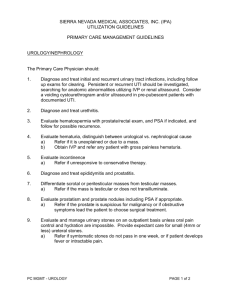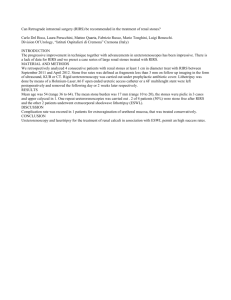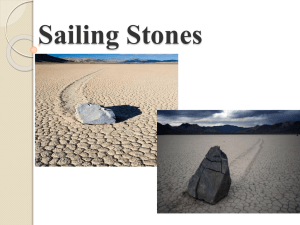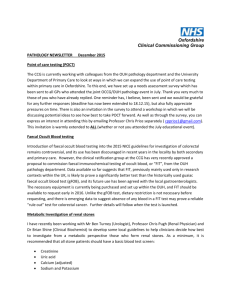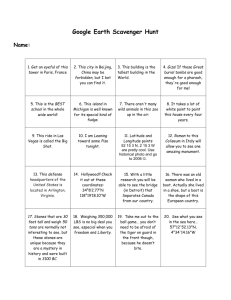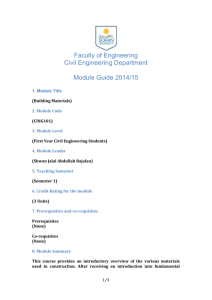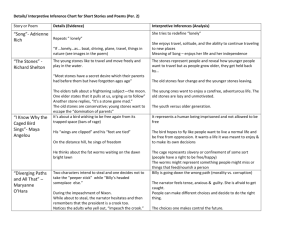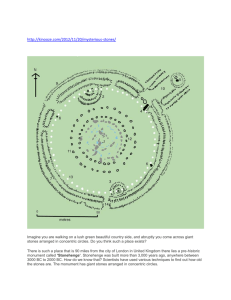How to effectively create a study schedule for Step 1
advertisement
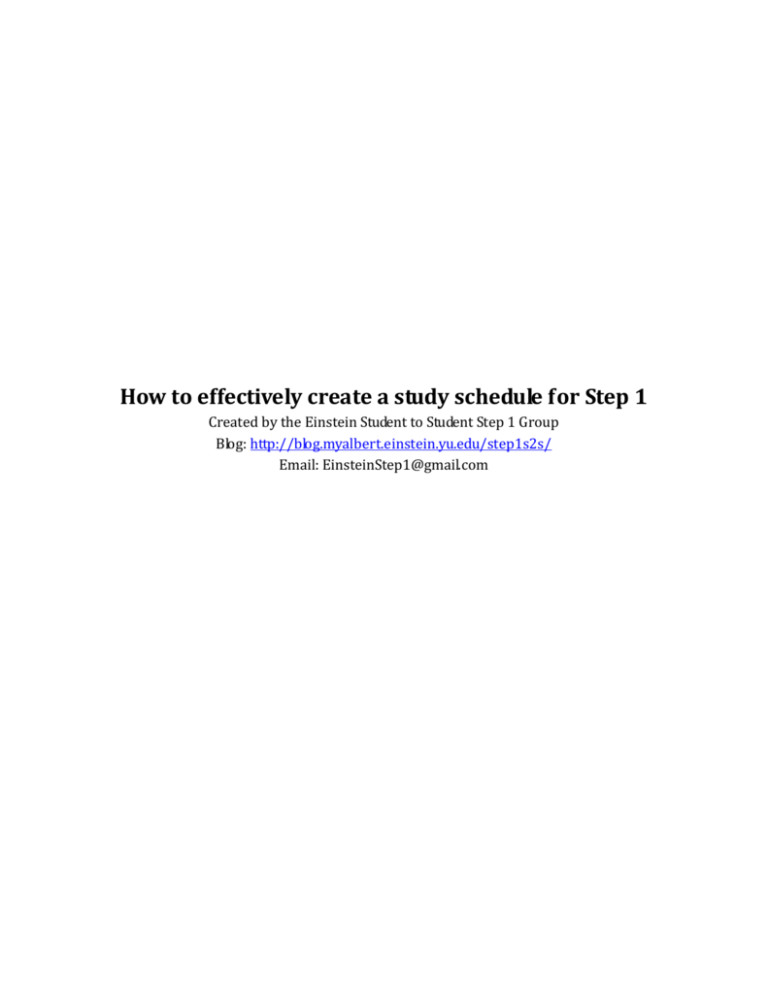
How to effectively create a study schedule for Step 1 Created by the Einstein Student to Student Step 1 Group Blog: http://blog.myalbert.einstein.yu.edu/step1s2s/ Email: EinsteinStep1@gmail.com Table of Contents Quick Tips The modified ‘3-pass’ method The Math: how much time do I really have? How do I divide up the material? Assigning the stones 'Crammable' Topics How to study during these ‘stones’? The rational behind studying your weak areas early The last week (3rd pass) The Day Before I need more help? What do you offer? Quick Tips: Make a schedule and stick to it. If you do not finish a topic in the time you allotted, you must move on or in the end you will get so far behind the topics at the end will suffer. Leave 1 day a week for “catch-up.” You can place them at the end of the study session or at the end of each week. It is impossible to know exactly how much time is needed for each section. If you have nothing to catch up on, you can always do extra questions or study a weakness. Or take a break! If you just can't study one evening – take it off! Watch a movie or do whatever you desire. Use your catch-up day for that topic. 6 weeks of studying is a lot! Don't burn out. Intermix “fun” topics with your weaknesses. In general you want to start with your weakest subject, however it would be daunting to do BioChem → Immuno → Micro if you don't really like those topics. Stick in a subject you 'like' or at least find interesting to break up the studying. Towards the end; work on your endurance. Fatigue is a major issue. No one is used to 7 hours of testing. We would recommend taking an NBME 3 weeks and 2 weeks before your test (these are 200 questions each). Structure it as you would a real test. Then 1 week before the test take 2 NBMEs (or the Uworld self-assessments) back to back to stimulate the real test. 400 questions! Pretend it is the real test and time your breaks! Leave the week before (or 5 days) to go over all of first aid/focusing on your weak areas. Change up your study location. AM session in your room, afternoon meet your study buddy in the library and finish out with an evening session in Belfer. Go into the city one day and work in the library. The bus ride would be an excellent time to listen to Goljan Audio! The modified ‘3-pass’ method: The 3-pass method is a tried and true method of studying for step 1. The basic idea of the 3-pass idea is to go over First Aid a total of 3 times. You began with a broad coverage of knowledge and understand the basics in the first pass, then in the second and third pass you learn the topic in more detail (and solidify your knowledge). The modified 3-pass method is our adaptation of this system specifically geared for Einstein students. The first pass everyone has already done – 1st and 2nd year classes. You are at least familiar with many of the basic topics in First Aid (also if you followed your classes with First Aid then you really have done a 1st pass). The 2nd pass then is the first 5-weeks of your dedicated study period (Talked about extensively below). The 3rd pass is the last week before your test. In addition, you are going to be doing random question throughout the 5 weeks in Uworld and looking up facts you are unsure about in First Aid. Thus this is another “pass” through the higher-yield parts of First Aid. In essence, you are going from a broad overview of the topics (1st and 2nd year) to high-yield specific facts (final review of First Aid) Now, let‟s learn how to make a schedule. The Math: how much time do I really have? Using the “stone” method as a way of organizing your schedule, each stone represents a 3 hour study block. Let's calculate how many stones you have during your study period. You have 8 weeks to study, but after taking off the weekend after exams, and 10 days for vacation before 3rd year, you have a full 6 weeks. Each week Sunday is going to be used for questions and NBMEs. Saturday is your catch up day. So you have 5 „study‟ days a week. You also want to leave the week before to go over First Aid and focus on weak areas. This means you have 5 weeks of planned study time. Each day you expect to study for 3 sessions (for example: morning 9:30-12:30, afternoon 1:30-4:30, and evening 6-9) So that is 5 days (week) * 3 stones a day * 5 weeks = 75 stones. You might be tempted to say, “I'm going to study 4-stones a day.” Remember these 9 hours a day are REAL hard studying time. If you get distracted easily in 12 hours you might only do 6 hours of work! Let these sessions be actual studying time – NOT JUST TIME SPENT IN BELFER. That said, this is your study schedule. If you are confident you are going to use more stones per week, go for it! So you have 75 stones. Each topic should get at least 1 stone, big topics that you are weak at can get up to 5 stones. The rest is personal style. Some things to consider – do you want a “renal” day (ie put your renal stones back to back) or do you want it more dispersed. Most people prefer to have the stones closer together. Don't forget to do questions during this time as well! How do I divide up the material? There are different ways of doing this, but our favorite is to break up topics by First Aid sections. Biostatistics/Behavioral Science – 16 pages Biochemistry – 52 pages Embryology – 18 pages Microbiology – 64 pages Immunology – 20 pages Pathology – 12 pages Pharmacology – 21 pages Cardiovascular – 34 pages Endocrine – 20 pages GI – 34 pages Heme and Oncology – 28 pages Musculoskeletal and Connective Tissue – 26 pages Neurology – 42 pages Psychiatry – 20 pages Renal – 20 pages Reproductive – 24 pages Respiratory – 16 pages Longer sections of First Aid should get more stones in general because Tao Le knows all. Assigning the stones The sorting of the stones is based on two factors: 1. Size of the subject 2. How well you know it Determining how big a section it is can depend on many factors, but the length in First Aid is a good place to start. The following is a basic tiered stone assignment based on First Aid length. Microbiology, Biochem – 5 stones Neuro, Cardiology, GI – 4 stones Heme/Onc Musculoskeletal/CT, Repro, Pharm – 3 stones Renal, Endocrine, Psych ,Immuno, Embryo, Respiratory – 2/3 stones (could go either way, assign based on your comfort with the subject) Behavioral Science/Biostats, Pathology – 1/2 stones This adds up to 48 - 56 stones. This is a basic layout for stones that must be modified by how well you know each topic. If your personalized study schedule allots for more stones, add them to your weak sections or save them for more question time. How well you know each topic is difficult to determine but the factors should include; score on the Einstein tests, how recently you took the course, and your gut. Although the tests in first and second year are not perfect, they are fair estimators of how well you know the material. If you rocked Cardiology because you're just down with Nordin, you can probably spend a stone or two less on the topic. When you took the course is very important and a big factor in how you order your stones. Since you finish the year with heme and musculoskeletal, you probably can spend less time on those as opposed to biochemistry which you did at the beginning of last year. The most important factor is your gut feeling on each subject. If you never felt comfortable with a certain subject and just crammed for the final, maybe you spend an extra stone on that section. In general, difficult topics include Biochemistry, Neurology and Pharmacology but you must decide what you felt was hardest and assign those subjects extra stones. Remember, the pharm topic in first aid covers mostly the concept of pharm and actual drugs are at the end of each chapter. So 3 stones for pharm, does not mean you have to learn all of the drugs in that time, rather that should be for the material in the firstaid section. Other factors include whether you plan to use supplemental materials on that topic and how well the topic is taught at Einstein. In general, supplemental materials outside of First Aid, Goljan and USMLE World is not necessary but there are a few good resources that you might want to skim through. If you decide to use one of these, you have to give extra stones to this subject. Please consider this carefully, as no single subject is worth too much of your time. Topics that are not taught well at Einstein is a controversial issue, but typically include Behavioral Science, Biochemistry, and Biostatistics and you may want to spend a little more time on those topics. Some people take a 'diagnostic test' that is offered in by some question banks but you can also use the school provided NBME test as your 'diagnostic'. You can look at your scoring in each subject to ascertain whether it is a strength or weakness. We would caution against this method as a primary way to determine your strength in the topic because particular tests can be random but it is a good supplemental assessment. So you have 75 stones from our calculations above. If you do a block of 48 (random) questions each day, that leaves about 50 stones to divide amongst 17 subjects. 'Crammable' Topics As defined by the great Tao Le, there are certain topics that are 'crammable'. This means that they require lots of memorization, so studying really hard for them in March isn't worth your time because you'll probably forget most of it by June. The crammable topics in order of crammability are Biochemistry, Microbiology/ID, Immunology, and Embryology. Study these topics later in your study schedule and spent a bit more time on them, especially if you are not a strong memorizer. Okay, I have allotted all my stones, and decided on 3 stones for renal, how do I study during these ‘stones’? This comes down to personal preference; one suggestion is to further subdivide the subject into areas. For example: Renal physiology, renal pathology, and renal pharmacology. In your AM session, your goal is to master all of renal physiology. So, for example: Pick up BRS physiology and do the section on renal physiology, then do the questions regarding renal physio in BRS. After that, finish the pages of firstaid regarding physiology. In your afternoon session, you decided on a question block, so you did random questions. Now in your evening session, you again have a renal block. You start with pathology with a goal of finishing renal first aid. In your 3rd session (the next morning) the first half you want to review some of the more challenging topics of renal pathology in Goljan. Then the 2nd half of that block, you learn all the drugs. Again, having structure and „goals‟ for each session will help you stay on track. Now lets say it takes you longer than you think to get through renal pharm. Add this to a list of topic to cover on your „catch up‟ day. The rational behind studying your weak areas early: In any given topic about 50% of questions are “basic” requiring superficial knowledge of key points, 30% require understanding the concept and applying it to a situation you probably never heard of, and 20% are difficult questions require a more in-depth understanding. In a sense 80% of questions on a given topic you should be able to get without being an expert and 20% would require expert knowledge. Say you are debating between using a day to study Renal (you love acid-base balance and love all things Raff), or studying Pulmonary (you hate the lungs and those stupid alveoli) You think – I'll just study renal and that way I'll basically be a nephrologist and get all the renal questions correct. But let‟s say right now you would probably get 80% of the renal questions correct and 20% of the pulm questions. If you study renal, you might get 100% of renal correct (doubtful since there will be random difficult questions) and still 20% pulm. OR you study the basics of pulm, get most of the “easier” questions right for about 60-70%, and still get 80% in renal. In summary, if you study renal you'd have a maximum of a 20% increase in questions correct and if you study pulm you'd have about a 40-50% increase in questions correct. You have more room for improvement in your weaker subjects, making them very important topics to study. Using this strategy will greatly help your score overall! The last week (3rd pass): So, it‟s the last week. There is so much information, how do you choose what to study? You must focus on the high yield information which is most likely to show up on the test. In our opinion, the highest yield information is the Rapid Review section at the end of First Aid, then First Aid itself, then Goljan blue margin notes. Additionally, if you made annotations into First Aid it becomes even higher yield. Start reading through the Rapid Review section first as it is full of quick one-liners on topics you have seen before. Ensuring you know these high-yield facts is important to not miss any of the 'easier' questions. This is about 19 pages long, so it should not take more than half to two-thirds of a study day. Next, start reading through your First Aid cover to cover. If you are unsure if you can finish reading the entire book in the time left, read your weakest subjects first. First Aid is extremely high yield and your annotations will take the highlights from other sources. This is one of the biggest advantages of annotating, so when you review your First Aid in the last week, you are really reviewing First Aid + USMLE World + all your other sources. But remember, DO NOT ANNOTATE TOO MUCH. This will make your final review very difficult, too long and lower yield. Not matter how well you annotate, First Aid is always the highest yield. There are about 467 pages of information in First Aid 2011. If you read 12 pages an hour (1 page per 5 minutes) and study 10 hours each day, you will finish in 4 days of studying. (12 pages *10 hours * 4 days = 480 pages in 4 days) Finally, if you have time you can skim through the blue margin notes in Goljan Rapid Review Pathology. These are mostly high yield facts, but not as useful as going through First Aid. Questions during the last week depends on where you are in the USMLE World Qbank. If you are not finished, continue doing blocks of 48 questions each day. DO NOT FEEL PRESSURED TO FINISH USMLE WORLD. While Uworld is an excellent resource as a whole, a particular section of 200 questions is not a high-yield review. In the last week, continue to do blocks of 48 questions but reading through First Aid is a higher yield review. If you have finished the Qbank, you have two options; do incorrect questions or don't do questions. Doing incorrect questions will allow you to keep yourself in the mindset of reading through long vignettes while also reviewing things you didn't know. However, if you feel like you need you finish reading through First Aid, don't do questions. At this point, you have done over 2,000 questions in the USMLE World Qbank plus several hundred from practice tests so you can afford to not do questions for the last week. The Day Before Sleep in. Relax. Go to the gym. Avoid studying. You have just spent the last 6 weeks (really the last 2 years) studying for a single test. You are prepared. You are ready. Stay calm. Do your best to go to sleep early and get some rest. Good luck! I need more help? What do you offer? The Einstein student to student step 1 group offers 4 ways to help. Blog: http://blog.myalbert.einstein.yu.edu/step1s2s/ The blog has information regarding study methods, previous student study plans, and survey results about the best resources! Discussion Board: http://myalbert.einstein.yu.edu/myalbert/phpbb3/viewforum.php?f=66 While still in its infancy, the discussion board is a place for you to ask fellow 2nd and 3rd years questions regarding step 1. Email: EinsteinStep1@gmail.com This email address is manned by 2 third year students who are here to answer any questions you have regarding step 1, or the student to student group. Please do not hesitate to ask! If you are unsure about your schedule and don‟t want to bother a friend, we can look over it and give suggestions! Meet one on one: Set up appointments using the email above! Time permitting (we are busy 3rd year students after all), we are able to meet with you to discuss anything step 1. We will address your concerns, help you create a study schedule, or just try and calm you down! Are you a poor test taker – we might be able to help you think about step 1 in a way to make you a better test taker! Unfortunately, we do not have the time to tutor step 1 content.
